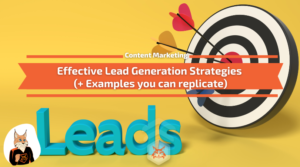Today’s shoppers demand to know why they should buy from you. In eCommerce, content marketing can be a formidable asset that helps you answer that question.
But it can gobble up resources when done poorly, so retailers need to invest wisely in their marketing efforts. We’ll show you how to build an eCommerce content marketing strategy that resonates with buyers and stakes out your place against your competitors.
What Is Content Marketing in E-commerce?
Content marketing is a branch of marketing that involves creating and sharing valuable free content to attract prospects and eventually convert them into customers. In eCommerce, retailers can use content marketing to educate, entertain, and inspire people to earn their trust and build brand awareness.
Doing this takes time. Content marketing will not lift your store’s sales tomorrow. It is one component of a marketing strategy, often used in conjunction with SEO and social media. Content marketing helps retailers grow long-term brand value. And as more people learn of you and come to love your brand, your cost of acquiring customers decreases.
Content marketing helps retailers grow long-term brand value. And as more people learn of you and come to love your brand, your cost of acquiring customers decreases.Click to tweetLet’s take a look at some success stories and the steps you can take to join their ranks.
3 Best-in-Class Ecommerce Content Marketing Examples
A direct connection to sales — or even products — isn’t always apparent, even in the best content marketing examples. But the three eCommerce stores highlighted below likely grew in part because of the connection they made with consumers via their content.
1. MR PORTER’s Journal
Blogging has become almost expected of retailers and can be a powerful vehicle for e-commerce content creation. MR PORTER, an online retailer selling men’s luxury clothing and personal care products, has created a digital magazine called The Journal that provides value above and beyond the company’s products.
The journal takes blogging to a new level with editorial content that gentlemen who wear luxury brands can relate to and aesthetics that make it a pleasure to browse.
Products take a backseat but are present. It’s all about delivering value in the content itself, which is precisely what makes content marketing work.
Try these techniques from MR PORTER’s retail content marketing in your own eCommerce content marketing:
- Feature influencers that your audience may have an interest in, and list the products that those influencers wear or use. See the technique MR PORTER’s used here: New York’s Best Chefs on How to Host an Epic Summer Party.
- Write a viral post, and include a section in the post that features your products and is relevant to what the reader is looking at that moment. An example of this is MR PORTER’s “what to pack” section in their travel-related post about The Coolest Places to Stay in Miami.
- Capitalize on an interesting angle when you feature a product. (See Five Classic Watches That Have Stood the Test of Time)
- Write how-to articles that feature products available for purchase on your site. (See A Surprisingly Comprehensive Guide to Grooming Your Eyebrows)
- Make people feel happy with beautiful photos (Party On: The Ultimate Houses to Rent for a Summer Bash) and catchy headlines (Six Smart Tips to Improve Your Life from a Brain Surgeon).
The company says that “high-quality, expensively produced content” was a founding principle for the eCommerce brand, and managing director Toby Bateman credits the combination of content and store with the company’s success. In fact, the company reports that the number of people who subscribe to its content updates is double that of its active customers. As of April 2018, the site had reached more than 25 million page views per month.
2. My Houzz Videos
Businesses are catching on that consumers don’t want to be advertised to; they want to be entertained. It’s no wonder that investment in branded entertainment is growing twice as fast as other marketing initiatives. Video provides the ideal medium for this type of eCommerce content marketing.
The online home design store Houzz started its own branded video series called My Houzz. The series features stars like Kate Upton and Neil Patrick Harris who worked with Houzz to do a secret home makeover for a loved one, with a big reveal at the end.
The brand uses celebrities as influencers to get attention, which builds top-of-funnel awareness for Houzz’s home design resources. My Houzz videos reference Houzz products, planting its brand firmly in front of the loyal followings of the stars.
Houzz started as a side project for a husband and wife team who were frustrated with their renovation efforts. In the early days of Houzz, the site gathered momentum through user-generated content. Folks uploaded their project photos and asked questions in forum-style discussions. According to press materials, the website boasts 40 million+ unique users monthly now. Ninety percent of Houzz users are homeowners who use Houzz to renovate and decorate their homes from start to finish.
3. Patagonia’s Documentaries
Storytelling has long played a role in marketing, and it also has a place in eCommerce. Retail giant Patagonia puts the narrative first in its content marketing, which spans documentaries, essays in its catalogs, blogging, and campaigns.
It embraces themes like environmentalism that are important to its target audience and the brand, using content that leaves no question of its deep commitment.
Patagonia appears so deeply vested in the causes it supports that it almost feels disingenuous to call it marketing. But that’s part of what helps eCommerce content marketing attract fans.
More than an outdoor clothing and gear company, Patagonia markets a lifestyle and ideals. The company proclaims that it’s “in business to save the planet.” For the consumers, it targets, this message creates a powerful appeal.
The company keeps its documentaries completely separate from product offerings, making this a top-of-the-funnel eCommerce content strategy. Blue Heart, it’s documentary about the ill effects of dams, lives on a subdomain of the Patagonia site, and, while you can see the brand’s affiliation, you won’t see its products highlighted.
Get-Started Guide for Ecommerce Content Marketing
Not every eCommerce store has the budget for celebrities or lavish video production. But smaller retailers can take advantage of the same principles with a well-thought-out content strategy.
Learn how to analyze competitors and spot opportunities to kick-start your own content marketing program following the steps below.
1. Determine Your Message
You can make a big impact with even a small investment if you focus on getting the message right. What do your customers care about that also matters to you and your business? Do you have a unique background or story to tell? What causes are you passionate about that align with your products?
Find out more by speaking with customers. For example, Oaks Jewelry might discover that local shoppers prefer to look at inventory online and then visit the shop in person to buy. This could indicate an opportunity to highlight the conveniences the company offers to local shoppers and its commitment to the local community in its content marketing.
When the story of your brand aligns with the values of your customers, you can build a sense of trust that advertising just can’t buy.
2. Choose Your Medium(s)
What content do you want to create and how will you deliver it to customers? Consider first how your audience prefers to consume information and then which mediums are within your reach. Try starting with the one that you think you can make the greatest impact with. After you’ve seen success, you can add more channels.
Here are some questions to help you pinpoint the right medium to start with:
- Can you blog regularly?
- How might videos fit into the picture?
- What about podcasting?
- Are there local or online events that your customers attend?
- Can you think of a way to tap into user-generated content like product hacks by customers, testimonials, an online user group, etc.?
- Would customers benefit from downloadable resources on your websites, such as ebooks, templates, checklists, or a printable calendar?
- What resources can you devote to social media, and what platforms are your customers using?
If one medium stands out as an opportunity, but you don’t currently have the resources you’ll need in-house, look at whether you can hire or outsource to make it happen.
3. Amplify Your Content
This is where you get into the “marketing” aspect of content marketing. Content creation by itself is not enough – you need to actively promote your content.
How will you amplify your message? Some options:
- Reward sharing of your content through a referral program.
- Work with influencers who appeal to your shoppers.
- Partner with brands you sell or other retailers or associations.
- Evaluate whether eCommerce SEO makes sense for you.
- Retarget people who interact with your content using paid ads.
- Capture emails of people who visit your site, so you can then remarket to them with an email newsletter.
No matter the message, medium, and marketing tactics you choose, start with a clear idea of your goals and how you’ll measure results. That way, you’ll know what’s working and when to try something new.
One Final Word of Advice and Your Next Step
Ecommerce content marketing can help you carve out a powerful competitive advantage as part of a marketing strategy. Just remember that content marketing is most effective when focused on building a connection with your audience. Your content itself must deliver value to earn engagement and trust.
![You are currently viewing eCommerce Content Marketing Guide [+ Examples]](https://competico.com/wp-content/uploads/2022/06/eCommerce-Content-Marketing-Guide.png)



![Read more about the article 20 Brilliant Blog Post Ideas [with 80+ Real Examples]](https://competico.com/wp-content/uploads/2020/02/Brilliant-Blog-Post-Ideas-300x167.png)

![Read more about the article How to create a Blog Media Kit that Sells On AutoPilot [2021]](https://competico.com/wp-content/uploads/2020/07/How-to-create-a-Blog-Media-Kit-that-Sells-On-AutoPilot-300x167.png)

